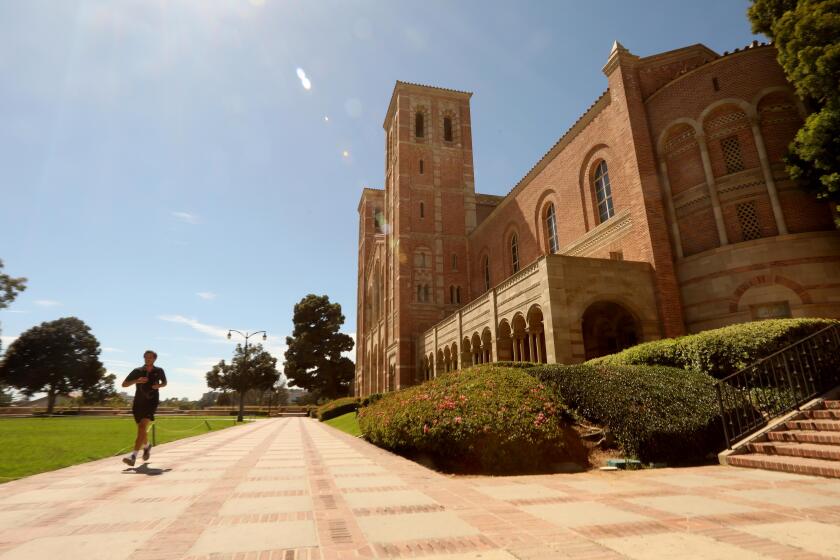Alarcon’s Blow Against Secession
Five years ago, when he was a city councilman from the San Fernando Valley, Richard Alarcon was the odds-on favorite to be Los Angeles’ first Latino mayor of the modern era. He was well regarded by Latino activists but, being from the Valley, had crossover appeal to conservative voters.
In 1998, Alarcon opted to pursue his political fortunes in Sacramento rather than City Hall; he’s now a Democratic state senator representing the East Valley.
But no matter where Alarcon’s political ambitions lead him next, he recently rendered a great service to Los Angeles--arguably greater than if he somehow had managed to become mayor.
Two weeks ago, Alarcon cast what may be the decisive vote that keeps the city whole. That happened when he announced that he would not support the effort to break the Valley away from Los Angeles and also rebuffed Valley residents who were urging him to run for mayor of the proposed new city.
Like a boxer’s one-two punch, Alarcon’s decision knocked the wind out of the secession movement, at least temporarily.
To be sure, city voters may yet approve proposals to allow the Valley and Hollywood to secede in November. But without Alarcon’s help, those campaigns will be much harder to win.
Why? First, because Alarcon is one of the Valley’s best-known elected officials and is especially popular among the 49% of Valley residents who are Latino. Of course, not all Latinos in the Valley vote. Many are too young or are not yet citizens. But Alarcon has proved in close contests that he can turn out those Latinos who do vote.
A recent Times poll found that among Latino voters in the Valley, 52% favored secession and 33% were opposed--numbers similar to those of their neighbors. Alarcon’s decision could sway many of the 15% who were undecided and even erode support among those Latinos who favor it. (The Times poll found Latino voters citywide opposed secession, 45% to 36%).
A handful of respected Latino activists in the Valley have talked about running for office in the proposed new city, which will assure at least some Latino voter support for secession. But a high-profile candidate for mayor would have energized Valley Latinos to support secession in a big way, and Alarcon was the only hope that secessionists had.
Every other Latino politico in town is already fighting secession, including City Council President Alex Padilla. He has gone so far as to form his own campaign committee, focusing on voters in his East Valley district.
Even former Assembly Speaker Antonio Villaraigosa, who was almost elected the city’s first modern Latino mayor last year, has agreed to temporarily forget the nasty campaign that Mayor James K. Hahn ran against him in order to co-chair, with Hahn and former Mayor Richard Riordan, a citywide campaign against secession.
On the city’s Eastside, where the Valley’s concerns often draw the bored yawns they do most places south of the Santa Monica Mountains, county Supervisor Gloria Molina is trying to organize a unified Latino campaign against secession. Her argument to Eastside voters is that one big city has more clout in Washington and Sacramento, where lots of the tax money to pay for L.A.’s infrastructure and social needs comes from, than two smaller cities.
But as helpful as all of these Latino political leaders will be in trying to keep the city together, none has the influence with Valley voters that Alarcon does.
Only Padilla can rival Alarcon’s roots in the Valley. Yet Padilla is somewhat neutralized in the secession campaign. If Padilla even flirts with secession, as Alarcon briefly did, he’ll be ousted as council president. And precisely because Padilla holds a prestigious City Hall position, secession backers can dismiss him as a stooge of the downtown interests that they claim control City Hall.
That’s unfortunate because lifelong Valley residents like Alarcon and Padilla bring bona fides to the campaign against secession that few other politicians can. They know first-hand the frustration that Valley residents sometimes feel when trying to get City Hall’s help. Padilla and especially Alarcon are living proof that Valley representatives can have real clout if they play their politics smart. Speaking of which, if Alarcon helps beat secession he may find himself back where he was as a city councilman--as one of the favorites to become Los Angeles’ first Latino mayor of the modern era.
And that’s all of Los Angeles--not the abbreviated version.
*
Frank del Olmo is the associate editor of The Times.
More to Read
Sign up for Essential California
The most important California stories and recommendations in your inbox every morning.
You may occasionally receive promotional content from the Los Angeles Times.










